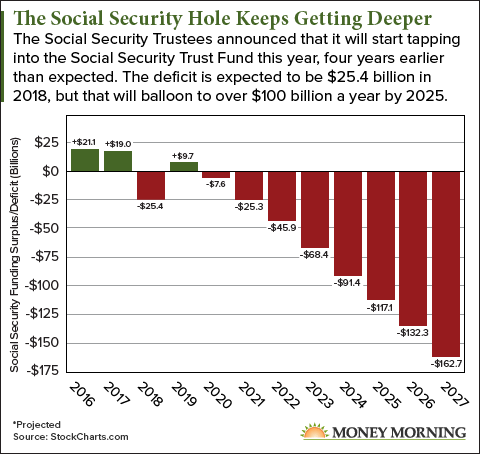If you've been watching the news, you may believe the U.S. Social Security funding crisis won't hit until 2034.
 That's pure fiction.
That's pure fiction.
Related: How More Fed Rate Hikes Will Crush Your Retirement
Starting this year, payments to recipients will exceed the total income received by the Social Security Administration (SSA) by $25.4 billion.
The report says SSA expects the shortfalls to continue "every year during the 75-year projection period."
The reason people aren't making a big deal out of this is because we have the $2.8 trillion Social Security Trust Fund to fall back on. That money is projected to cover the annual deficits until 2034.
There's just one problem.
The Social Security Trust Fund is not an account with $2.8 trillion in it. It's a stack of IOUs sitting in a filing cabinet in Parkersburg, W.Va. It's nothing but debt.
Technically those IOUs are U.S. Treasuries, but this particular flavor of Treasury cannot be sold or traded in the bond markets. It can only be redeemed by the U.S. government - which needs to pay for it with money from the General Fund.
The federal government has three options to pay for something: new or increased taxes, cuts elsewhere in the budget, or borrowing.
It's as if the Social Security Trust Fund never existed.
A Congress required to make up the shortfall in the SSA budget would have the exact same three options for funding it. There's no practical difference.
The Social Security funding crisis is now, my friends.
Here's how we got into this mess...
Who's to Blame for Today's Social Security Funding Crisis
If you're looking for scapegoats, U.S. President Ronald Reagan tops the list. He was behind the Social Security Amendments of 1983, which implemented changes supposed to shore up the program for decades to come.
Among the moves Congress made were making benefits taxable for wealthier beneficiaries, requiring the self-employed to pay the full tax rather than just the employee's portion, and speeding up already-planned payroll tax increases.
[URGENT] $25 billion in unpaid benefits could be disbursed - are you owed money?
The changes were a great success, generating $2.8 trillion of surplus revenue for the Social Security Trust Fund in the decades since.
But instead of setting this money aside, the Reagan administration decided to funnel it into the General Fund of the federal budget and issue bonds - those IOUs I mentioned earlier - to the Trust Fund.
Successive administrations, both Republican and Democrat, followed suit.

Over the years, the money intended to fortify Social Security for the wave of retiring baby boomers that started in 2007 was instead used to pay for tax cuts, wars, and an assortment of wasteful government expenses.Successive administrations, both Republican and Democrat, followed suit.
Now we're facing an annual Social Security funding deficit that will add to the strain on a federal budget that's already running annual deficits in the $500 billion to $1 trillion range...
A Ballooning Deficit Will Force Washington's Hand
The problem will just keep getting worse as the size of the deficit accelerates.
The Social Security trustees expect a $25.4 billion shortfall for 2018, but the program's annual deficit will exceed $100 billion by 2025. By 2030, the annual deficit will be in the $200 billion range.
You see where this is going.
Congress is well aware that money is long gone (it spent it, after all) and knows it will need to take some sort of action in the next few years. Congress can't afford to wait until 2034, when the Social Security Trust Fund will, ahem, "run out."
Lawmakers uniformly fear tampering with Social Security because so many people - one out of six Americans - depend on it. And these folks, for the most part senior citizens, vote at higher rates than other age groups.
Social Security's reputation for being the "third rail" of U.S. politics is well deserved.
But just about any action Washington takes will have implications not just for those receiving Social Security befits, but for all Americans.
Here's what you could be facing...
How Congress Will Try to "Fix" Social Security
[mmpazkzone name="in-story" network="9794" site="307044" id="137008" type="4"]
One option for Congress is reducing payments to current Social Security beneficiaries.
It's unlikely due to the voting power of older Americans - but not impossible.
Contrary to popular belief, paying into the system doesn't guarantee you'll get anything back. While current law specifies what you receive, Congress can change that law at any time.
How much you've paid into the system, from a legal standpoint at least, is irrelevant.
Nevertheless, past changes to the program have typically shielded current recipients from changes that would reduce their benefit checks. Recipients will probably keep getting full benefits.
What's more likely is that Congress will add to burden of current workers by increasing the payroll tax and/or further raising the full retirement age.
Congress could also choose to kick the can down the road indefinitely. That's one of its favorite strategies when faced with tough fiscal problems.
But that would mean wrestling with Social Security's rising impact on the annual federal budget. The options there are the same three mentioned earlier: raising taxes, cutting spending, or borrowing more money.
Lawmakers have shown a congenital inability to do either of the first two. So they're almost certain to deal with the issue by ramping up borrowing.
Here's where things get a bit tricky...
Not All Government Debt Is Created Equal
Borrowing the money to redeem the Social Security Trust Fund bonds would seem to be the easiest way out.
After all, you'd just be swapping one kind of government debt for another. The total owed wouldn't change.
But the Social Security debt is what's known as "intergovernmental debt" - money the government owes itself. That's not the same debt held by the public, which the government owes to any extra-governmental entity that buys its bonds - citizens, businesses, other governments.
Intergovernmental debt is classified separately from public debt because, from an accounting perspective, it's a wash. That's why it's not reported as a liability on the government's consolidated financial statements.
It's also why the CIA doesn't include intergovernmental debt in the U.S. debt-to-GDP ratio, a measure of a nations' ability to make good on its debts.
Excluding intergovernmental, the debt-to-GDP is 77.26%. But tapping the Social Security Trust Fund will change it from intergovernmental to public debt. Adding the entire $2.8 trillion puts you at 91.29% - a far riskier level.
Of course, the Social Security Trust Fund will be depleted over 16 years, theoretically giving the U.S. economy a chance to grow enough to keep the ratio steady.
But the federal budget is so far out of whack in the wake of the Trump tax cuts that $1 trillion annual deficits are likely for years. The International Monetary Fund (IMF) said in an April report that it expects the United States to be the only nation to have a rising debt-to-GDP ratio over the next five years.
While economists disagree on the exact level where debt-to-GDP starts to pose serious problems to a nation's economy, they do agree that a rising ratio is a troubling sign.
Once debt-to-GDP gets past 100%, it raises concerns about a nation's ability to pay it back. And that concern translates to higher interest rates. Higher interest rates hurt consumers by making everything bought on credit cost more, from houses to cars to anything purchased with a credit card.
In the bigger picture, higher interest rates tend to throttle a nation's economy, slowing growth that can cause a rise in unemployment.
It's a huge mess. And it's a mess of Washington's own making.
The Government's 33 Years of Mistakes Could Be Costing You $23,441
Mistakes on the part of Social Security Administration employees have led to SEVERELY underpaid benefits for tens of thousands of Americans.
And though the SSA has admitted their wrongdoing, I'm willing to bet it won't be tracking you down to hand you your money back.
If you're eligible and you take action now, you could receive a lump-sum of the money owed to you within five days.
There's $23,441 at stake - don't leave that on the table.
Follow me on Twitter @DavidGZeiler and Money Morning on Twitter @moneymorning, Facebook, or LinkedIn
About the Author
David Zeiler, Associate Editor for Money Morning at Money Map Press, has been a journalist for more than 35 years, including 18 spent at The Baltimore Sun. He has worked as a writer, editor, and page designer at different times in his career. He's interviewed a number of well-known personalities - ranging from punk rock icon Joey Ramone to Apple Inc. co-founder Steve Wozniak.
Over the course of his journalistic career, Dave has covered many diverse subjects. Since arriving at Money Morning in 2011, he has focused primarily on technology. He's an expert on both Apple and cryptocurrencies. He started writing about Apple for The Sun in the mid-1990s, and had an Apple blog on The Sun's web site from 2007-2009. Dave's been writing about Bitcoin since 2011 - long before most people had even heard of it. He even mined it for a short time.
Dave has a BA in English and Mass Communications from Loyola University Maryland.



